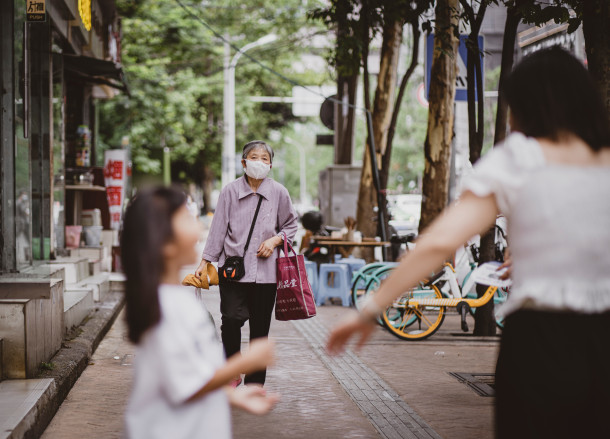
Li Lin on Unsplash
Public space for all: transforming society from the ground up
Public space is the building block of our communities. The link between well-being and healthy public spaces has never been clearer. The Covid-19 pandemic has demonstrated the negative consequences of limited access to green, inclusive and safe public spaces on the mental health of city residents. This episode of ‘Cities are listening’, co-organised by UCLG, UN-Habitat and Metropolis on 7 April, invited experts and city leaders from Brussels, Buenos Aires, La Paz and Munich to discuss the value of public space for mental health in metropolitan areas.
Public space is essential for life
With the majority of the world’s populations living in metropolitan areas, public space is a key factor for well-being and health. Public space contributes to children’s development, community life, reduces stress levels and improves mental health and well-being. Yet public space is a key component of city infrastructure that is often overlooked.
Not everything can be solved at a local level, yet public space is the place where we can start transforming our societies. The Covid-19 pandemic has brought to light the fragility of our urban spaces and the key role played by local and metropolitan governments in transforming the built environment. For instance, postcode is one of the greatest predictors of life expectancy. There are strong correlations between class, race, gender, disability and health outcomes. Today, vulnerable communities are being greatly affected by the pandemic because of poor access to services, green areas and the quality of their housing. These issues have been exacerbated by mobility restrictions and lockdowns, which have further increased the inequality gap between metropolitan spaces.
Mental health issues are on the rise. Globally, 800 million people suffer from mental health issues. This is particularly true in cities, which have higher rates of depression. Ensuring access to high quality green spaces is key to preventing mental illness, reducing stress, improving well-being and overall health, and ensuring the cognitive development of children in metropolitan areas. The most effective solutions are often inexpensive and practical, such as increasing physical activity through walking and cycling, or strengthening social cohesion through citizen participation.
“Local and metropolitan governments have a once in a lifetime opportunity to improve people’s connection to places and to build social resilience.” - Ethan Kent, Executive Director of PlacemakingX.
Local governments need to give space back to people to empower citizens. Public space is essential for health and life. Cities such as Brussels, which used to be car-oriented, are transforming their urban areas to give space back to the people and provide greater access to public and green spaces within easy walking distance, as well as places to meet and go out, good air quality and spaces to exercise. Other cities, such as La Paz, are using active listening to tackle mental health problems and foster empathy in the city, and Buenos Aires is promoting accessibility for all to ensure health, promote soft mobility and support local businesses.
“Public space is the living room of a city; just like in your house, the living room is the most important room in the house.” - Pascal Smet, Secretary of State for the Brussels-Capital Region and Metropolis Regional Vice-President.
Looking deeper: what makes great public spaces?
Linking urban planning with the health sector is essential to ensure healthy cities. Metropolitan spaces need coordinated governance across municipalities and equitable and well-planned cities that encourage mixed-use neighbourhoods, healthier lifestyles and flexible public spaces. Local and metropolitan governments need to encourage greater interaction between health, urban development, and planning to develop better public spaces and improve mental health outcomes. Furthermore, urban planning has to take climate change into account and put people at the centre of policymaking. Much work has been done in relation to public space in Europe and the United States, yet research and policy need to look further into the variety of experiences and needs across countries and within each country. Measuring, monitoring and evaluating is key to developing a holistic approach to health and urban planning that promotes equity. Going forward, we need to renew the social contract and empower communities all over the world to provide the best possible standards of living.
Covid-19 has made us rediscover the value of public space as a key factor for well-being. We need to rethink our urban spaces to create more inclusive, democratic, sustainable and healthy metropolitan spaces. Join Metropolis' Call to Rethink our Metropolitan Spaces and be part of the change, and learn more about integrating health in urban and territorial planning with UN-Habitat and WHO’s new sourcebook for urban leaders, health and planning professionals.

